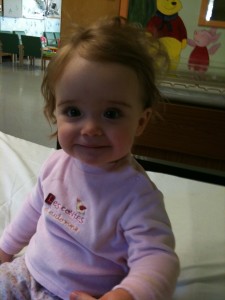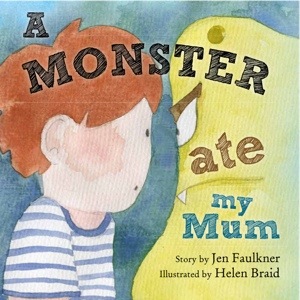 Blurrghhh! What a horrid week!
Blurrghhh! What a horrid week!
Poor Miss B (pictured left, in hospital) came down with Norovirus and had to go to hospital.
After 24 hours of constant vomiting and diarrhoea, Betsy looked and felt awful. She couldn’t crawl or move, so I called the doctor who told us to go straight to hospital.
After just having had Oscar (almost 4 weeks old) it wasn’t the best time for littly to get ill, but she did, and she managed to replay the scene from the exorcist a few times with her projectile vomiting over the house, us and her bed! Luckily Oscar missed the sick fountains and missed contracting the virus himself which is particularly dangerous in newborns.
The worst episode of projectile pukiness was in the hospital car park, full on in my face as I got her out of her seat. Nice. I will no doubt be replaying this scene over the coming years of bugs and viruses. Oh the joys of parenting! Childcare is fun? Not this week my lovelies!
The staff at Stafford hospital were amazing (as always) and looked after Betsy so well. They even managed to get her to drink two huge cups of fluid replacement drink, which she managed to keep down and avoid having a drip (which I was dreading!)
So then- Nasty noro, what are the symptoms?
The symptoms of a norovirus infection usually start one to two days after becoming infected, but they can start after 12 hours.
The first symptom is usually a sudden onset of nausea, which is followed by projectile vomiting and watery diarrhoea. Some people may also have:
- A raised temperature (over 38C/100.4F)
- Headaches
- Stomach cramps
- Aching limbs
Dehydration
- The severe vomiting and diarrhoea caused by the norovirus can lead to dehydration (a lack of fluid in the body).
- Dehydration is more of a risk in the very young and the elderly.
Symptoms of mild dehydration include:
- dizziness or light-headedness
- headache
- tiredness
- dry mouth, lips and eyes
- dark, concentrated urine
- passing only small amounts of urine (fewer than three or four times a day)
- When you are severely dehydrated, you may experience more extreme symptoms such as dry, wrinkled skin, an inability to urinate, a weak pulse and low level of consciousness.
- Mild dehydration is common and can be easily reversed by drinking lots of fluids. However, severe dehydration can lead to serious complications and be fatal in some cases.
What to do?
- There is no specific treatment for a norovirus infection and you will usually not need to visit a doctor unless your child is very young (newborns must get treatment right away)
- Stay at home.
- Take paracetamol (Calpol for babies over 3 months and children) to relieve symptoms of any fever.
- Drink plenty of water (keep feeds up for babies) to replace the fluids lost through diarrhoea and vomiting. This prevents dehydration.
- Drinking plenty of fluids is particularly important for young children and the elderly, who are more prone to dehydration.
- Try to eat a light diet of foods that are easy to digest, such as soup, rice, pasta and bread. Babies should be given their normal feed throughout.
- To reduce the risk of passing the virus onto others, wash your hands regularly and stay at home until you are clear of symptoms for 48 hours.
** If you or your child have any of the symptoms of severe dehydration after catching a norovirus infection, seek medical attention as soon as possible.**




Leave a Reply